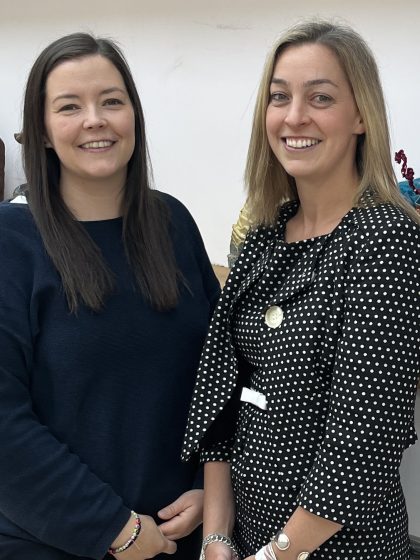Victoria Powne and Zoe Thornton, Heads of Physics and Biology respectively at Bradford Grammar School, reflect on their leadership roles in science education, the power of subject passion and the importance of visible female role models in STEM. Together, they offer insight into what makes their departments—and their teaching—stand out.
Victoria – Head of Physics
When I joined BGS as a newly qualified teacher back in 2013, I didn’t expect to still be here over a decade later—let alone leading the department I started in. But this is a school that brings out your best. It challenges you, supports you and surrounds you with curious minds. That’s what keeps me here.
My route into physics came from a natural curiosity and a love for the clarity the subject offers. I studied Natural Sciences at university—really a physics and maths degree by another name—and always found comfort in the objectivity of the subject. There’s something satisfying about questions that have one right answer; a logic that leaves no room for ambiguity.
But when I was at school, physics didn’t always feel accessible. It carried that classic stereotype: dusty textbooks, dated teaching styles and very few women in the room. When I became a teacher, I was determined to help break that mould. I wanted my students—girls and boys alike—to see someone who didn’t fit the stereotype, and to know that this subject could belong to anyone. I didn’t set out to be a role model, but I see now that representation matters deeply. Just being here, leading the department, visible in classrooms across the school—it makes a difference.
I lead a team of five other physicists (all male, ironically), and together with our fantastic technician, we deliver a curriculum rooted in excellence but grounded in relevance. Our goal is always to connect physics to the real world—helping students see its impact in everyday life and industry. Whether that’s through visiting a particle accelerator or applying physics to engineering, we aim to ignite imagination.
And it works. BGS students consistently achieve strong physics results—our department often ranks among the highest-performing at GCSE—and we run a thriving A-Level programme, with numbers well above national averages. We also enter national competitions like the Physics Olympiad, and our students regularly bring home gold awards.
Outside the classroom, our co-curricular provision is another way we stretch and challenge. One of our teachers runs a STEM club where students undertake independent research, developing scientific thinking beyond the syllabus. This kind of hands-on engagement is key to demystifying physics—and making it fun.
Of course, I want all my students to succeed. But when I see a young woman go on to study physics or engineering at university—and I’ve seen several—it feels particularly meaningful. Because while I love my subject, I also want to help shape a future where women are equally represented in these fields. That’s not just better for gender equality—it’s better for science, too.
Zoe – Head of Biology
My journey into biology wasn’t a straight line, but it was always grounded in a deep curiosity for the natural world. I grew up outdoors, surrounded by animals and mud and questions. That instinct to explore—whether it was pond life or leaf structures—has never left me. It’s part of who I am, and it’s central to how I teach.
After earning my degree in biology, I completed a PGCE in Leeds and then spent two years teaching in a comprehensive school in London. It was a formative time, but I knew I wanted something different—somewhere I could dig into my subject more deeply. I joined BGS in 2012 and haven’t looked back.
What’s unique about BGS is that biology, chemistry and physics are run as entirely separate departments. There’s no umbrella ‘science’ here. That means every teacher is a subject specialist, and every pupil is taught by someone with genuine expertise and passion for their field. It gives our students the best possible foundation.
In biology, we’re a team of six teachers and two technicians, each with our own specialisms—from forensics to microbiology to environmental science. This diversity enriches our teaching and allows students to see the breadth of what biology can offer. We’ve recently invested heavily in new resources—high-spec microscopes, advanced data loggers and cutting-edge lab equipment—so our students have access to tools that mirror those used in industry and research. But it’s not just about kit. We try to bring biology to life: heading outdoors when we can, encouraging inquiry-based learning and making space for
curiosity.
At A-Level, biology remains a hugely popular choice. Many of our students aim for medical or veterinary careers, but increasingly, we see those who take it simply because they love the subject. I call it ‘hobby biology’—and it’s wonderful to see. We also run a thriving Biomed Society, where students explore topics beyond the curriculum and engage with guest speakers, from researchers to clinicians. It’s about inspiring not just achievement, but ambition.
I believe teaching should go beyond exams. That’s why we encourage our pupils to pursue their own scientific interests, read widely and explore the world around them.
Like Victoria, I also recognise the power of representation. Though biology tends to have more gender balance than some other STEM subjects, we still need visible female leaders in science—especially in leadership. It matters. Our students should grow up seeing that success in STEM isn’t tied to gender. It’s about passion, perseverance and potential.
“I believe teaching should go beyond exams. That’s why we encourage our pupils to pursue
their own scientific interests, read widely and explore the world around them.”
